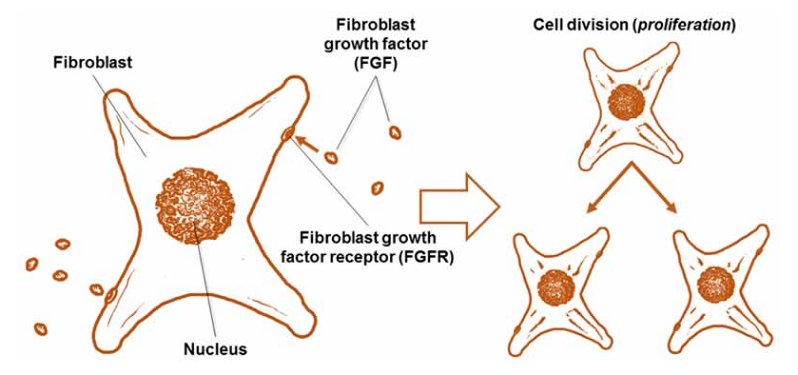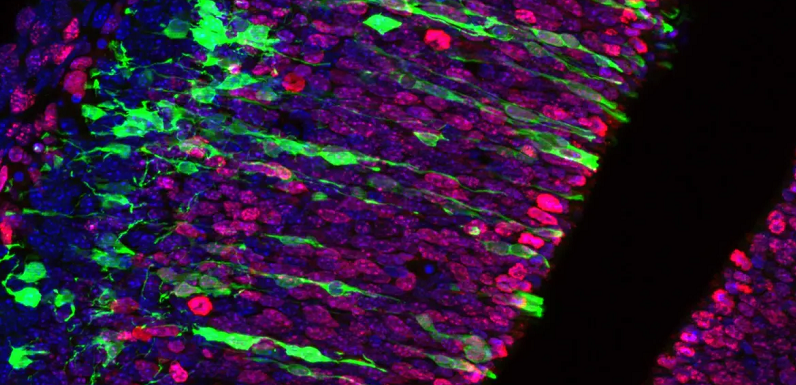
Often overlooked, Fibroblast Growth Factors (FGFs) are remarkable biological agents that are at the forefront of groundbreaking research in neuroscience and cognitive sciences. From guiding the intricate process of brain formation in the early stages of life to influencing cognitive functions such as memory and learning in adulthood, FGFs play a multifaceted role. Here we explore how these growth factors contribute to neuronal differentiation and brain plasticity, and delve into their significance in maintaining cognitive health.
Contents
Understanding Fibroblast Growth Factors (FGFs)
Fibroblast Growth Factors (FGFs) are more than just components in the biological puzzle of the human body; they are key players in our developmental and physiological processes.
Definition and Types of Fibroblast Growth Factors (FGFs)
Fibroblast Growth Factors, or FGFs, are a family of growth factors, involved in an array of biological processes. These proteins are known for their ability to stimulate cellular division and proliferation. Essentially, they are signaling molecules that communicate with cells to perform specific functions.
There are 22 known types of FGFs in humans, each with a unique function and mode of action. These types range from FGF1 to FGF23, and they vary in their target tissues and specific roles. Some are involved in embryonic development, while others play a role in adult tissue repair and maintenance.
Role of FGFs in Cellular Processes
The roles of FGFs extend beyond mere growth stimulation. These growth factors are crucial in processes such as wound healing, embryonic development, and angiogenesis (formation of new blood vessels). They function by binding to their specific receptors on the cell surface, triggering a cascade of cellular events.
This binding activates various signaling pathways within the cell, leading to changes in gene expression, cellular differentiation, and migration. This ability to influence a wide range of cellular activities underscores the significance of Fibroblast Growth Factors in overall body physiology.
FGFs in the Nervous System
In the context of the nervous system, FGFs assume an indispensable role. They are involved in the development of the central and peripheral nervous systems, influencing the growth and differentiation of neural stem cells into neurons and glial cells.
FGFs have been found to promote the survival of neurons and facilitate neural regeneration. This is particularly evident in the brain, where Fibroblast Growth Factors contribute to the maintenance of neural networks and plasticity. This aspect of FGFs is crucial, as it relates to their potential role in repairing brain damage and in treatments for neurodegenerative diseases [1].

FGFs in Brain Development
The role of Fibroblast Growth Factors (FGFs) in brain development is both intricate and vital – they contribute to various stages of brain development, from the earliest phases of neural formation to the fine-tuning of neural networks.
FGFs in Early Brain Formation
The journey of brain development begins in the embryonic stage, where FGFs play a crucial role. They are instrumental in the initial formation of the neural tube, the precursor to the central nervous system. FGFs guide the proliferation and differentiation of neural progenitor cells, laying the foundation for the complex architecture of the brain.
These growth factors also influence the patterning of the brain, ensuring that different regions develop correctly and proportionately. This early influence of Fibroblast Growth Factors is critical, as it sets the stage for the overall structure and function of the brain [2].
Impact of FGFs on Neuronal Differentiation
As development progresses, FGFs continue to be key players. They are involved in the differentiation of neural progenitor cells into neurons and glial cells, the two main cell types in the nervous system. This differentiation is crucial for the formation of functional neural circuits.
FGFs regulate the migration of neurons to their appropriate locations in the brain. This migration is essential for the formation of various brain regions and for establishing the necessary connections between different parts of the brain.
FGFs and Brain Plasticity
Even after the initial phases of brain development, FGFs remain active participants. They contribute to brain plasticity, which is the brain’s ability to change and adapt in response to new information, experiences, and injuries.
This plasticity is crucial during the early years of life as it allows for the development of cognitive abilities like learning and memory. Fibroblast Growth Factors facilitate the formation of new synaptic connections and the remodeling of existing ones, processes that are fundamental to learning and memory.

FGFs and Cognitive Health
The influence of Fibroblast Growth Factors (FGFs) extends beyond the physical development of the brain, playing a significant role in cognitive health and functioning.
Influence of FGFs on Cognitive Functions
FGFs are vital for maintaining cognitive functions throughout a person’s life. They are involved in neurogenesis, the process of generating new neurons, even in adulthood. This ongoing neurogenesis is crucial for cognitive flexibility, problem-solving, and adapting to new information [3].
Research indicates that FGFs contribute to the health and functioning of the hippocampus, a brain region integral to learning and memory. By promoting the growth and survival of neurons in the hippocampus, Fibroblast Growth Factors play a critical role in these cognitive processes.
FGFs in Adult Neurogenesis
In the adult brain, FGFs are particularly influential in the process of neurogenesis, which occurs in specific regions like the hippocampus and subventricular zone. This neurogenesis is essential for memory consolidation and the integration of new experiences.
FGFs regulate the proliferation of neural stem cells and their subsequent differentiation into neurons. This regulatory role is crucial in replacing lost or damaged neurons and in maintaining the plasticity and adaptability of the brain throughout adulthood.
Role of FGFs in Memory and Learning
FGFs are key in modulating synaptic plasticity, the ability of synapses to strengthen or weaken over time. This plasticity is fundamental to learning and memory. By influencing synaptic strength, Fibroblast Growth Factors can affect how memories are formed and retained [4].
Studies have shown that disruptions in FGF signaling can lead to cognitive impairments. Conversely, enhancing FGF activity has been observed to improve cognitive functions in animal models, suggesting potential therapeutic avenues for cognitive disorders.
FGFs in Brain Disorders
The role of Fibroblast Growth Factors (FGFs) is not limited to normal brain function and development; they also play a significant role in various brain disorders. This section delves into the involvement of FGFs in neurodegenerative and neurodevelopmental disorders and their potential therapeutic implications.
FGFs in Neurodegenerative Diseases
Neurodegenerative diseases, such as Alzheimer’s and Parkinson’s, are characterized by the progressive loss of structure or function of neurons. FGFs have been found to have a protective role in these conditions. They promote neuronal survival and regeneration, which can help in slowing down the progression of neurodegeneration.
Research has shown that the levels and activity of Fibroblast Growth Factors are altered in neurodegenerative diseases. For instance, in Alzheimer’s disease, dysregulation of FGF signaling pathways has been observed. This suggests that modulating FGF activity could be a potential strategy for treating these disorders [5].
FGFs and Neurodevelopmental Disorders
In neurodevelopmental disorders such as autism spectrum disorders and Rett syndrome, FGFs have been found to play a crucial role. These disorders are often characterized by impaired brain development and functioning.
Alterations in FGF signaling pathways have been linked to these developmental abnormalities. For example, mutations affecting FGF receptors or signaling components have been associated with certain neurodevelopmental disorders. Understanding these links is critical for developing targeted therapies to correct or mitigate the effects of these disorders.
Potential Therapeutic Implications Involving FGFs
The relationship between FGFs and brain disorders opens up exciting possibilities for therapeutic interventions. Targeting FGF pathways could lead to new treatments for a range of neurodegenerative and neurodevelopmental conditions.
Current research is focused on developing drugs that can modulate FGF signaling to either enhance or inhibit their activity, depending on the disorder. These therapeutic strategies hold promise for not only treating symptoms but also potentially altering the course of these diseases.
References
[1] The fibroblast growth factor system in cognitive disorders
[2] The Role of Fibroblast Growth Factor Receptors in the Morphogenesis
[3] Fibroblast Growth Factor Signalling in the Diseased Nervous System
[4] Fibroblast growth factors: from molecular evolution to roles in development, metabolism and disease
[5] FGF-23 Deficiency Impairs Hippocampal-Dependent Cognitive Function

